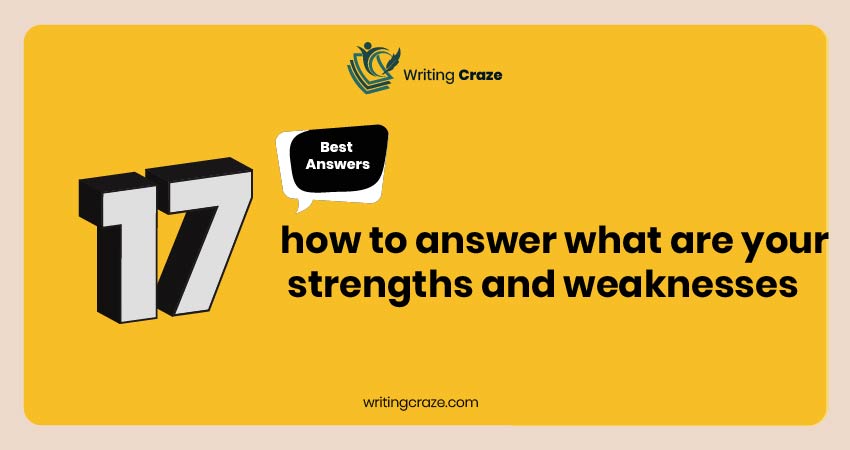How To Answer What Are Your Strengths and Weaknesses 17 ANS
If you’re asked in an interview what your strengths and weaknesses are, you’ll want to have a good answer prepared. Your interviewer is likely trying to gauge how well you know yourself, as well as see if there are any areas for improvement. However, answering this question can be difficult. In this blog post, we’ll give you 17 examples of how to answer this question. We’ll also provide tips on how to turn your weaknesses into strengths. So, read on for all the information you need to nail this question in an interview!
5 Personality assessment Interview questions
In a personality assessment interview, employers are looking to find out more about who you are as a person. Here are five questions they may ask:
- What motivates you?
- What are your strengths?
- What are your values?
- What do you like and don’t like about working with others?
- Tell me about a time when you faced a challenge at work.
It’s important to remember that there is no “right” answer here – instead, focus on sharing a specific example of a time when you were faced with a challenge and how you coped with it. This will give the employer insight into how you deal with difficult situations and whether you’re someone who rises to challenges or shrinks away from them.

How to answer strength and weakness in interview
When interviewers ask about your strengths and weaknesses, they’re usually looking for two things: first, they want to get a sense of what you’re good at, and second, they want to see how you deal with difficult questions. Answering this question well requires a bit of preparation. First, take some time to think about your key strengths. What are the qualities that make you stand out from other candidates? Next, consider which of these strengths would be most relevant to the role you’re applying for. Once you’ve identified a few key strengths, it’s time to start thinking about weaknesses. Again, it’s important to be honest here – but you also want to choose a weakness that won’t completely derail your chances of getting the job.
A good way to do this is to choose a weakness that can be seen as a strength in the context of the role you’re applying for. For example, if you’re applying for a job that requires a lot of independent work, you might say that your weakness is that you sometimes have trouble listening to others’ suggestions. Finally, once you’ve identified your strengths and weaknesses, practice articulating them in a way that sounds natural and confident. Remember, the goal is not only to answer the question well but also to show off your communication skills. With a little preparation, you can confidently answer any question the interviewer throws your way.
Answer Example 1:
I am very proactive and take initiative to get things done.
Weakness: I can be a little short-tempered when things don’t go my way.
Answer Example 2:
My greatest strength is my ability to stay calm under pressure and think clearly in difficult situations. I have a strong work ethic and I’m always one of the first ones in the office in the morning and one of the last to leave at night. One of my weaknesses is that I sometimes work too hard and don’t take enough time for myself.
Answer Example 3:
My strength is that I am very persistent and I never give up until I reach my goal. My weakness is that I can be a little too persistent at times and push people away.
How to answer strength and weakness question
When interviewers ask about your strengths and weaknesses, they are usually looking for two things: first, they want to see if you have a realistic self-assessment of your skills; and second, they want to see how you deal with difficult questions. Answering this question effectively requires careful preparation. First, take some time to reflect on your key strengths and weaknesses. What are you really good at? What do you enjoy doing? Also, What do you find difficult?
Answer Example 1:
my strength is that I am very passionate about my work and I always give 100% to whatever task I am working on. My weakness is that I sometimes have trouble saying no to people who ask me for help, even when I am already stretched thin. This can lead to me feeling overwhelmed and stressed out.
Answer Example 2:
My strength is that I am able to work independently and identify solutions to problems. My weakness is that I sometimes work so independently that I do not communicate effectively with my team.
how do you answer what are your strengths
When interviewers ask, “What are your strengths?,” they’re hoping to learn about your most positive attributes and how you can apply them to the role you’re interviewing for. This question allows you to demonstrate not only what makes you great, but also why you’re the best candidate for the job. Here are some tips for how to answer, “What are your strengths?”:
First, take a moment to reflect on your most positive qualities. What sets you apart from other candidates? What qualities would make you successful in the role you’re interviewing for? Once you’ve identified your strengths, give a specific example of a time when you’ve put those qualities into action.
For example, if you’re applying for a customer service position, you might say that your greatest strength is your ability to stay calm under pressure. You could then describe a time when a customer was angry and upset and how you diffused the situation by staying calm and professional.
When answering this question, be sure to avoid generalities like “I’m a people person.” Instead, focus on giving specific examples that illustrate your unique strengths. By doing so, you’ll increase your chances of impressing the interviewer and landing the job.
Answer Example 1:
I would say that my strength is my ability to be very organized and efficient. I am able to manage multiple tasks simultaneously and always meet deadlines. So, I have a strong attention to detail, which ensures that all the details of a project are taken care of. And lastly, I have a great team-orientation and am able to work well with others.
Answer Example 2:
I have a strategic mindset and can think ahead, anticipate potential obstacles and come up with contingencies. I’m also detail-oriented and have a knack for taking complex scenarios and breaking them down into manageable steps.
Answer Example 3:
I am able to articulate what my strongest skills are, and how they can benefit an employer. I am also able to provide concrete examples of how I have utilized these skills in past roles. Finally, I am always willing to learn and take on new challenges, so I can continue developing my strengths.
how to answer what is your greatest strength and weakness
When interviewers ask what your greatest strength and weakness are, they’re looking for two things: first, they want to see if you have self-awareness about your skills and abilities; and second, they want to see how you deal with difficult questions. Being prepared for this question will help you give a confident, positive answer that will impress the interviewer.
To start, take some time to think about your key strengths and weaknesses. What are you good at? What do you struggle with? Once you have a few examples in mind, try to frame them in a positive light. For example, if you’re not great at public speaking, you could say that you’re good at working one-on-one or in small groups.
When you’re asked the question in an interview, be concise and honest in your answer. Don’t try to downplay your weaknesses or gloss over them; instead, focus on how you’re working to improve. For example, if you’re not great at public speaking, you could say that you’re working on building your confidence by taking some Speak up courses.
By showing that you’re aware of your weaknesses and are taking steps to improve them, you’ll demonstrate that you’re a ambitious and driven candidate who’s always looking to improve.
Answer Example 1:
My greatest strength is that I’m a quick learner. I’m able to pick up new skills quickly and efficiently. My weakness, however, is that I sometimes take on too many tasks at once and end up spread too thin. Thankfully, I’ve learned how to better manage my time so this doesn’t happen as often.
Answer Example 2:
I pride myself on my ability to be a quick learner and my willingness to take on any task, big or small. My weakness is that I can be a bit of a perfectionist, which can sometimes slow me down.
Answer Example 3:
My greatest strength is that I’m very proactive and always take the initiative to get things done. My weakness is that I can be a bit of a perfectionist and can struggle to let go of projects or tasks once I’ve started working on them.
Conclusion
The best way to answer the question of what your strengths and weaknesses are, is to be honest and give examples. We’ve given you 17 different ideas to choose from, but feel free to adapt them as needed. And remember, practice makes perfect! The more you prepare for this question in advance, the better off you will be during your interview. So good luck and happy practicing!


![How To Answer What Are You Looking For [11 Samples]](https://writingcraze.com/wp-content/uploads/2022/09/How-to-answer-what-are-you-looking-for-768x407.jpg)
![How to Answer Salary Expectations [Example 11]](https://writingcraze.com/wp-content/uploads/2022/09/How-to-Answer-Salary-Expectations-1-768x407.jpg)
![How to Reply Interview Invitation [15 Examples]](https://writingcraze.com/wp-content/uploads/2022/09/How-to-reply-interview-invitation-768x407.jpg)
![How to Answer Why Do You Want This Job [11 Samples]](https://writingcraze.com/wp-content/uploads/2022/09/How-to-Answer-Why-Do-you-Want-this-Job-768x407.jpg)
![How To Introduce Yourself In Interview Sample Answers [17+ Ans]](https://writingcraze.com/wp-content/uploads/2022/09/How-to-introduce-Yourself-in-interview-Sample-Answer-1-768x407.jpg)
![How To Answer Interview Questions [13 Examples]](https://writingcraze.com/wp-content/uploads/2022/09/Interview-Questions-and-How-To-Answer-768x407.jpg)
